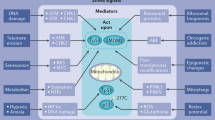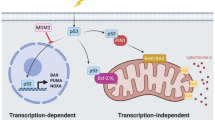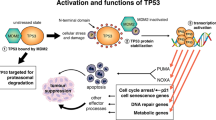Abstract
Loss of function of the tumour suppressor gene p53 is a key event in most human cancers. Although usually occurring through mutation, in some tumour types this appears to be achieved via an indirect mechanism involving inappropriate expression of a functional inhibitor, mdm2, which binds to the transactivation domain of p53. This interaction offers an ideal potential target for novel cancer therapies. However, therapeutic specificity may depend on the extent to which this p53-inhibitory action of mdm2 is also required by normal cells. Transgenic data have already established that mdm2 is needed to prevent embryonic lethality, but the situation in adult cells is still unclear. Here we show that micro-injection of normal human fibroblasts with an antibody directed against the p53-binding domain of mdm2 induces expression of p53-responsive genes, and furthermore results in p53-dependent growth arrest. We conclude that normal cell proliferation can be dependent on negative regulation of p53 by mdm2, a finding which raises an important note of caution for mdm2-directed cancer therapies.
This is a preview of subscription content, access via your institution
Access options
Subscribe to this journal
Receive 50 print issues and online access
$259.00 per year
only $5.18 per issue
Buy this article
- Purchase on Springer Link
- Instant access to full article PDF
Prices may be subject to local taxes which are calculated during checkout
Similar content being viewed by others
Author information
Authors and Affiliations
Rights and permissions
About this article
Cite this article
Blaydes, J., Wynford-Thomas, D. The proliferation of normal human fibroblasts is dependent upon negative regulation of p53 function by mdm2. Oncogene 16, 3317–3322 (1998). https://doi.org/10.1038/sj.onc.1201880
Received:
Revised:
Accepted:
Published:
Issue Date:
DOI: https://doi.org/10.1038/sj.onc.1201880
Keywords
This article is cited by
-
The impact of cellular senescence in cancer therapy: is it true or not?
Acta Pharmacologica Sinica (2011)
-
Mdm2 links genotoxic stress and metabolism to p53
Protein & Cell (2010)
-
MNK1 and EIF4E are downstream effectors of MEKs in the regulation of the nuclear export of HDM2 mRNA
Oncogene (2008)
-
GC-selective DNA-binding antibiotic, Mithramycin A, reveals multiple points of control in the regulation of Hdm2 protein synthesis
Oncogene (2006)
-
Inhibiting the p53–MDM2 interaction: an important target for cancer therapy
Nature Reviews Cancer (2003)



